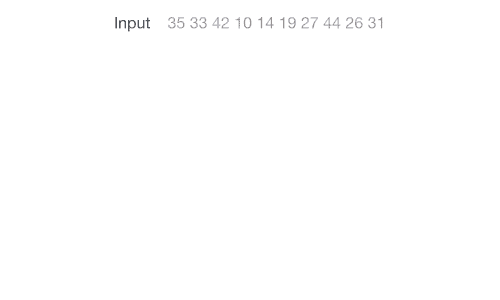 Documentation
¶
Documentation
¶
Overview ¶
Package heap contains fast implementations, concurrent safe for basic tree data structures.
Implicit Heap - O(log n) Min&Max heap/priority queue, used to store key/value pairs with fast access to the minimum/maximum element.
Index ¶
- type ImplicitHeap
- type ImplicitHeapMax
- type ImplicitHeapMin
- func (h *ImplicitHeapMin) HasElement() bool
- func (h *ImplicitHeapMin) IsDepleted() bool
- func (h *ImplicitHeapMin) Len() int
- func (h *ImplicitHeapMin) Peek() (v interface{}, ok bool)
- func (h *ImplicitHeapMin) Pop() (v interface{}, ok bool)
- func (h *ImplicitHeapMin) Push(priority int, value interface{})
- func (h *ImplicitHeapMin) Reset()
Examples ¶
Constants ¶
This section is empty.
Variables ¶
This section is empty.
Functions ¶
This section is empty.
Types ¶
type ImplicitHeap ¶
type ImplicitHeap interface {
Push(priority int, v interface{})
Pop() (v interface{}, ok bool)
Peek() (v interface{}, ok bool)
Reset()
Lock()
Unlock()
IsDepleted() bool
HasElement() bool
Len() int
}
ImplicitHeap is an interface for dynamic min & max implicit heaps.
An implicit heap is an implementation of a heap consisting of a complete binary tree whose nodes contain the heap items, one node per item.
It can be used as a Priority queue as well. It can store a series of objects (of any type) associated with a key (priority). Use ImplicitHeapMin to always get the smallest key (priority) and ImplicitHeapMax for the largest key.
For best performance use a small non sparsed Key value distribution. (100-300 incremental values).
type ImplicitHeapMax ¶
type ImplicitHeapMax struct {
ImplicitHeapMin
}
ImplicitHeapMax A dynamic list of numbers, stored as a Binary tree in a dynamic slice. Used to quickly get the biggest number from a list/queue/priority queue.
Inherits all the methods of ImplicitHeapMin.
Example ¶
autoLockMutex := false
maxPriority := NewImplicitHeapMax(autoLockMutex)
//add 3 priorities, with any data types
maxPriority.Push(3, false)
maxPriority.Push(1, "alfa")
maxPriority.Push(9, []int{0, 0})
max, _ := maxPriority.Pop()
fmt.Printf("max is %v", max)
Output: max is [0 0]
func NewImplicitHeapMax ¶
func NewImplicitHeapMax(autoLockMutex bool) *ImplicitHeapMax
NewImplicitHeapMax Builds an empty Implicit Heap Max struct.
type ImplicitHeapMin ¶
ImplicitHeapMin A dynamic tree (list) of numbers, stored as a Binary tree in a dynamic slice. Used to quickly get the smallest number from a list/queue/priority queue.
It is a base struct for ImplicitHeapMax.
Example ¶
autoLockMutex := false
minPriority := NewImplicitHeapMin(autoLockMutex)
//add 3 priorities, with any data types
minPriority.Push(3, false)
minPriority.Push(1, "alfa")
minPriority.Push(9, []int{0, 0})
min, _ := minPriority.Pop()
fmt.Printf("min is %v", min)
Output: min is alfa
func NewImplicitHeapMin ¶
func NewImplicitHeapMin(autoLockMutex bool) *ImplicitHeapMin
NewImplicitHeapMin Builds an empty ImplicitHeapMin
func (*ImplicitHeapMin) HasElement ¶
func (h *ImplicitHeapMin) HasElement() bool
HasElement Check if the list has at least 1 elment left
func (*ImplicitHeapMin) IsDepleted ¶
func (h *ImplicitHeapMin) IsDepleted() bool
IsDepleted Check if the list is empty
func (*ImplicitHeapMin) Len ¶
func (h *ImplicitHeapMin) Len() int
Len How many elements are in the heap
func (*ImplicitHeapMin) Peek ¶
func (h *ImplicitHeapMin) Peek() (v interface{}, ok bool)
Peek Find-* returns the first value (root element) O(1). For ImplicitHeapMin returns the value for the smallest key(priority). For ImplicitHeapMax returns the value for the largest key(priority). Does not mutate the list
func (*ImplicitHeapMin) Pop ¶
func (h *ImplicitHeapMin) Pop() (v interface{}, ok bool)
Pop Delete-*, return the first value (root element) O(log(n)) For ImplicitHeapMin returns the value for the smallest key(priority). For ImplicitHeapMax returns the value for the largest key(priority). Removes the element from the list
func (*ImplicitHeapMin) Push ¶
func (h *ImplicitHeapMin) Push(priority int, value interface{})
Push Insert a new key/value pair in the list.
func (*ImplicitHeapMin) Reset ¶
func (h *ImplicitHeapMin) Reset()
Reset Feed all your data to the Garbage Collector.
